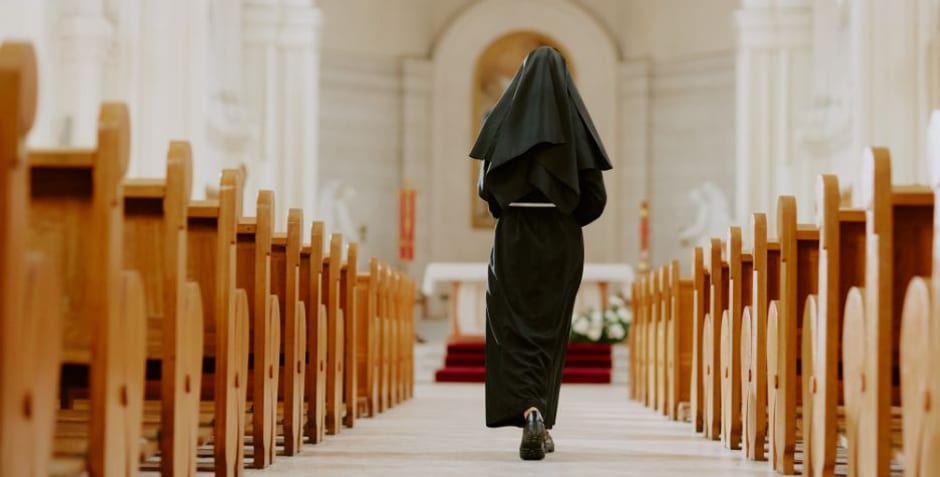

ECHR: Can The Courts Force Monasteries To Reinstate A Former Nun?
ECHR: Can The Courts Force Monasteries To Reinstate A Former Nun?
Sister Elisabeth belonged to a religious community affiliated with the Ukrainian Greek Catholic Church between 2011 and May 2017. That month, due to a conflict with her community, Sister Elisabeth left the monastery and ceased all communal life with the other nuns. In the eyes of her former community and her bishop, Sister Elisabeth is no longer a nun and must be considered under her civil identity, Zhanna K.
According to the Ukrainian Court of Appeal, Zhanna K.’s former monastic cell is still her home.
However, since February 2018, Zhanna K. has wanted to return to the monastery and live in her former cell. She has tried several times to enter, but the locks have been changed. She allegedly has no other place to live. Zhanna K. invoked her right before the Ukrainian courts to return to the monastic cell she occupied for eight years as Sister Elisabeth.
Zhanna K. won her case in a decision by a Ukrainian court of appeal on December 18, 2023. According to this court, her cell constituted a home within the meaning of Article 8 of the European Convention on Human Rights and the monastery must therefore allow her to exercise her right to return to live in that home. The court of appeal ruled that the monastery must give Zhanna K. new keys to the monastery gate and the entrance door to the cells.
In response to this decision, the monastery brought the case before the Ukrainian Supreme Court. The monastery argues that the dispute falls within canon law rather than civil law. It relies in particular on the principle of autonomy of religious organizations, protected by freedom of religion within the meaning of Article 9 of the European Convention.
An advisory opinion to be issued by the Grand Chamber of the ECHR
Before ruling on the dispute, the Ukrainian Supreme Court referred the case to the European Court of Human Rights (ECHR) through the advisory opinion procedure, lodged on August 21, 2025. The Ukrainian Supreme Court asked the ECHR whether the monastic cell of a former nun was protected as a home, on the one hand, and whether the civil courts had jurisdiction to rule on such a religious dispute, on the other.
The requested advisory opinion will be delivered by the Grand Chamber, which is the most solemn formation of the ECHR. It will therefore have an impact on the recognition of the rights of religious communities throughout Europe. The European Center for Law and Justice (ECLJ) has been authorized to intervene as a third party in the proceedings and filed its written observations on October 31, 2025. These observations demonstrate that a monastic cell is not the home of a nun, especially after she has left the community, and that such a question is a matter for the internal organization of the community.
The Ukrainian Court of Appeal is mistaken about the nature of a monastic cell
Is the right to respect for one’s home, protected by Article 8 of the European Convention, applicable to a monastery? If so, the holder of that right must be the monastery itself, and not each individual nun. Indeed, the ECHR has already recognized that legal entities may be entitled to the right to respect for one’s home, for example in the case of head offices, agencies, or professional or association premises[1]. It could therefore consider that the building used by a religious congregation constitutes its home.
In any case, a monastic cell cannot be separated from the monastery as a whole. The organization of a monastery is communal, and nuns choose to take vows that involve, among other things, sharing all their property and renouncing private ownership (the vow of poverty), refraining from founding a family (the vow of chastity), and obeying the superior of the congregation (the vow of obedience).
In this context, cells are regarded as places of retreat and prayer, not as personal dwellings. They are small and uniform. A nun cannot change the decoration or furniture in her cell, as this is the responsibility of the superior of her community. Nor does a nun have the right to invite people from outside the community into her cell. She usually takes her meals together with the other nuns and not in her cell.
The European principle of “autonomy of religious organizations” applied to the monastery
This monastic reality has no secular equivalent. For this reason, a specific regime must be applied to it, that of freedom of religion, recognized in Article 9 of the European Convention. This freedom gives religious organizations the right to respect for their autonomy, a principle enshrined in the ECHR[2]. Autonomy aims to ensure that religious organizations are “allowed to associate freely, without arbitrary State intervention”[3].
Thus, religious communities are free to operate as they see fit[4] and free to define “the criteria for membership” and therefore to “exclude existing members”[5]. The State must accept “the right of such communities to react, in accordance with their own rules and interests, to any dissident movements emerging within them”[6]. The ECHR also considers that “in the event of a disagreement over matters of doctrine or organisation between a religious community and one of its members, the individual’s freedom of religion is exercised through his freedom to leave the community”[7].
Thus, if the monastic cell occupied by Zhanna K. was never her home, that cell cannot, a fortiori, be considered her home after she left the monastery and is no longer a nun. Requiring the monastery to house Zhanna K. would imply either reinstating her to monastic life as Sister Elizabeth or revising the entire functioning of the community to provide her with a special place as a lay person. Such an obligation would violate the monastery’s right to respect for its autonomy.
The Ukrainian Court of Appeal exceeded the limits of its jurisdiction
The principle of autonomy of religious organizations has consequences for the jurisdiction of civil courts in such cases. Civil courts may enforce the decisions of religious organizations, but they may not judge their merits[8]. In essence, the examination by civil courts must be limited to verifying that there has been no abuse on the part of the religious authorities, i.e., ensuring that those authorities have not misused their power for purposes other than religious ones[9]. By granting a former nun the right to return to live in her cell against the monastery’s decision, the Ukrainian Court of Appeal has therefore overstepped their competence [10].
This ruling by the Court of Appeal was all the more unexpected given that Ukrainian law offers monasteries guarantees regarding their freedom to organize and use their buildings[11]. Furthermore, even adopting a broad interpretation of the right to housing, providing a cell to a nun does not create any civil right under Ukrainian law[12].
European case law does not protect the right to squat in a dwelling
Even in a secular context, accommodation linked to the performance of a function – such as tied accommodation – does not enjoy the same protection as a home[13]. When a person leaves the position, they must also vacate the premises, in particular so that they can be reallocated to new employee having the same position.
In its advisory opinion to the Ukrainian Supreme Court, the Grand Chamber of the ECHR could also draw on its case law on housing. However, Article 8 of the European Convention does not guarantee the right to obtain housing[14], let alone the right to obtain a particular type of housing or housing in a specific location[15]. Nor does the ECHR protect the right to have the authorities resolve a person’s housing problems[16].
________
[1] See: DELTA PEKÁRNY a.s. v. Czech Republic, No. 97/11, October 2, 2014, § 77. See also: Buck v. Germany, no. 41604/98, April 28, 2005, § 31; Kent Pharmaceuticals Ltd and Others v. United Kingdom (dec.), no. 9355/03, October 11, 2005; Association for European Integration and Human Rights and Ekimdjiev v. Bulgaria, no. 62540/00, June 28, 2007, § 60; Société Colas Est and Others v. France, no. 37971/97, April 16, 2002, § 41.
[2] This has been invoked on several occasions in the Grand Chamber, in the following cases: Sindicatul Păstorul v. Romania [GC], no. 2330/09, January 31, 2012, in particular § 74; Fernández-Martínez v. Spain [GC], no. 56030/07, June 12, 2014, in particular §§ 127-129; and Károly Nagy v. Hungary [GC], 56665/09, September 14, 2017. This principle was reaffirmed in the case of Ţîmpău v. Romania, no. 70267/17, December 5, 2023, in particular §§ 187-188, 216.
[3] Fernández Martínez v. Spain [GC], cited above, § 127.
[4] Jehovah’s Witnesses of Moscow and Others v. Russia, no. 302/02, June 10, 2010, § 118.
[5] Sviato-Mykhaïlivska Parafiya v. Ukraine, no. 77703/01, June 14, 2007, §§ 146 and 150 (free translation).
[6] Fernández Martínez v. Spain [GC], cited above, § 128.
[7] Ibid. See also: Com. ECHR, X. v. Denmark (dec.), no. 7374/76, March 8, 1976; Miroļubovs and Others v. Latvia, No. 798/05, September 15, 2009, § 80; See on this subject: Abbé Jean-Pierre Schouppe, La dimension institutionnelle de la liberté religieuse dans la jurisprudence de la Cour européenne des droits de l’homme, Paris, Pedone, 2015, p. 225.
[8] See, for example: Kohn v. Germany (dec.), no. 47021/99, March 23, 2000. The ECHR rejected the application lodged by a former member of a religious community challenging the enforcement by civil courts of a decision by that community ordering his expulsion from its premises. The Court considered that there had been no interference by the State, since the latter had merely enforced the disputed decision without verifying its merits, thereby respecting the internal autonomy of the religious community.
[9] Ţîmpău v. Romania, op. cit., §§ 137-139.
[10] See in this regard the decisions of December 6, 2011, in the cases of Baudler v. Germany (no. 38254/04), Reuter v. Germany (no. 39775/04), and Müller v. Germany (no. 12986/04). See also: Károly Nagy v. Hungary [GC], no. 56665/09, September 14, 2017, §§ 60-63 and dissenting opinion of Judge Pinto de Albuquerque; Boulois v. Luxembourg [GC], no. 37575/04, April 3, 2012, § 90; Denisov v. Ukraine [GC], no. 76639/11, September 25, 2018, § 44; Bilgen v. Turkey, no. 1571/07, March 9, 2021, §§ 56 and 63; Ţîmpău v. Romania, cited above, §§ 122 and 139; Dudova and Duda v. Czech Republic (dec.), no. 40224/98, January 30, 2001; Ahtinen v. Finland, no. 48907/99, September 23, 2008.
[11] Law No. 987-XII of April 23, 1991, “On Freedom of Conscience and Religious Organizations,” Articles 5 and 18. This freedom is based on the separation between the State and religious organizations (Article 35 of the Constitution).
[12] See: Article 47 of the Constitution; Articles 29 § 1 and 379 of the Ukrainian Civil Code; Article 3 §5 of Law No. 1382-IV of December 11, 2003, “On Freedom of Movement and Free Choice of Place of Residence in Ukraine.”
[13] See, for comparison, Hartung v. France (dec.), No. 10231/07, November 3, 2009; Fédération nationale des associations et syndicats de sportifs (FNASS) and others v. France, Nos. 48151/11 and 77769/13, January 18, 2018, §§ 154, 157-158.
[14] Chapman v. United Kingdom [GC], no. 27238/95, January 18, 2001, §§ 98-99; Ward v. United Kingdom (dec.), no. 31888/03, November 9, 2004; Codona v. United Kingdom (dec.), no. 485/05, February 7, 2006; Ghailan and Others v. Spain, no. 36366/14, § 53, March 23, 2021; Faulkner and McDonagh v. Ireland (dec.), nos. 30391/18 30416/18, March 8, 2022, § 98.
[15] Faulkner and McDonagh v. Ireland (dec.), cited above, § 98; Garib v. Netherlands [GC], no. 43494/09, § 141, November 6, 2017.
[16] Faulkner and McDonagh v. Ireland (dec.), cited above, § 98; Hudorovič and Others v. Slovenia, nos. 24816/14 and 25140/14, § 114, March 10, 2020.












